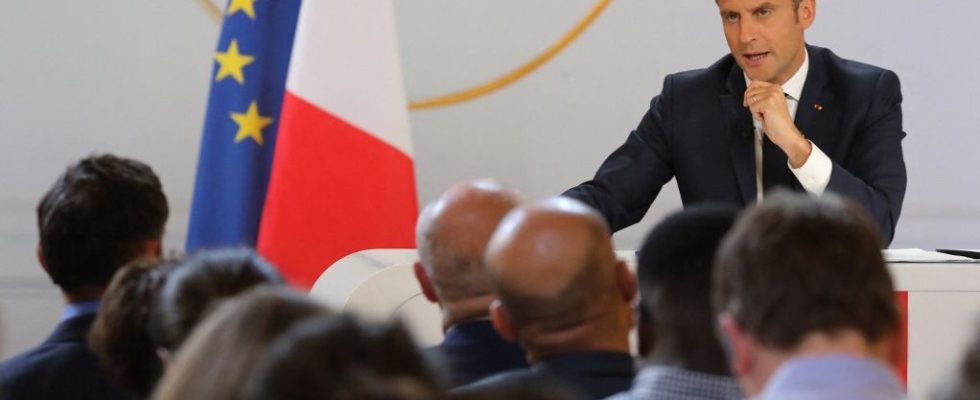Certainly, the press conference will take place at an unusual time, 8:15 p.m., which is surprising. But it is above all the very fact of organizing a press conference which surprises. Tuesday evening, Emmanuel Macron will hold only his third press conference at the Elysée in seven years. And the last one took place… in 2019, almost five years ago. The current head of state does not really stand out in the French landscape: the presidents of the Republic in recent decades have rarely practiced the exercise, very popular with de Gaulle or Pompidou. Nicolas Sarkozy gave three press conferences, including one solely on international issues. That of January 8, 2008 is remembered: it was there that he declared “this is serious”, about his budding relationship with Carla Bruni.
Jacques Chirac gave four in twelve years. But above all he gave one, at the very beginning of his first mandate, in 1995, where he replaced the “traditional” television interview of July 14 with a press conference. It didn’t last. After a first significant conference in 1981, where he notably announced major works in Paris, François Mitterrand mainly gave press conferences on diplomatic subjects: notably seven in just five months during the Gulf War.
“Press conferences have become dated with digital technology”
“It’s linked to the evolution of the media landscape,” believes Gaspard Gantzer, who was François Hollande’s communicator. There are plenty of other ways to express yourself directly in the media, either through social networks. The press conference is a form of expression closely linked to the advent of traditional written and audiovisual media. It was going very well at the start of the Fifth Republic, but it became dated with digital technology. It’s very difficult to renew the genre. » For Gantzer, these are “good reasons” to do something else. An Elysian advisor agrees: “We must not get stuck in a format, our era allows this evolution. And then each shape corresponds to a moment. In the same week you can have a tweet, a speech, a column, an interview, a speech… And then the press conference is above all an exercise for journalists and insiders, but the president must address the French. »
This is where things get stuck and we arrive at what Gaspard Gantzer calls the “bad reasons” for squeezing press conferences. For him, and he has been saying this for a long time, Emmanuel Macron does not consider journalists. “The head of state does not like their way of approaching things, he does not like this type of questioning. And on Tuesday, inevitably, there will be questions he won’t want to answer. » Now, it is still a bit like the principle of regularly submitting to the rolling fire of questions from journalists. In the pile, there are good ones, there are bad ones, and there are some that you don’t want to answer and that you will nevertheless be asked in front of millions of viewers.
“In a press conference, there are always surprises”
François Hollande, whose advisor Gantzer was, is an exception: he gave six press conferences, between 2012 and the end of 2015. Initially, he was supposed to give one every six months. If the pace has finally faded, the former socialist president denotes. “François Hollande liked it because he really liked the joust that took place in this setting. Emmanuel Macron is more often on the defensive. He is good at ping-pong but less of a fan of the press. » It’s true that we saw the current president rather at ease on the ground, during a stroll, chatting with passers-by or shopkeepers. Even when he was pushed around. But in communication as in everything else, macronism is annoyed by intermediate bodies. The great debate, the memorial roaming, the twenty or even thirty minute television speeches, this is “disintermediated” communication, without questions from journalists.
The presidential advisor quoted above chokes up: “It’s not a question of avoiding journalists. Otherwise you don’t go face the whole gang of ”C to you” in the middle of the controversy over immigration law. » For Gaspard Gantzer, this type of on-set interview has nothing to do with it: “Things are more structured, we know the themes and the path of the interview is very well defined. We don’t know the questions but there are few surprises. And we saw it in a caricatured way in ”C à vous”. In a press conference, there are always surprises. »
Let us note, however, that our Presidents of the Republic give press conferences all the time: at the end of international summits, at the end of European councils in Brussels, or during bilateral meetings with foreign leaders, etc. , where domestic issues are little or not addressed. Above all, this shows that outside French borders, it is more difficult to escape questions from journalists. The German chancellor, the British prime minister or the Canadian prime minister generally have to answer many more questions from journalists on a daily basis. Joe Biden, the President of the United States, has given fewer press conferences than his predecessors but this has caused controversy.

